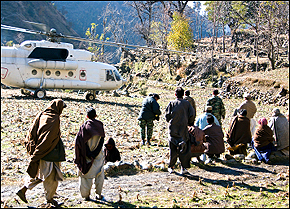Environmental Change To Impact Health of Millions Via Threats To Food, Air and Water, Report Finds
 New report paints the human race’s picture as grim and unstable if more action isn’t taken against climate change to protect the “building blocks” of large populations.
New report paints the human race’s picture as grim and unstable if more action isn’t taken against climate change to protect the “building blocks” of large populations.
In the run-up to historic climate talks in Copenhagen, a new report by the Worldwatch Institute and United Nations Foundation (U.N.F) warns that mankind’s impact on the environment threatens not just the health of other species, but of the human race as well.
The report, Global Environmental Change: The Threat to Human Health, notes that rapid changes in climate and land are shifting the distribution of diseases like malaria, making more people sick in many cases. These shifts pose the biggest threat to poor populations in developing countries, according to the report. Most of the damage can be prevented, though, via national-level risk assessments and technical and financial assistance that help countries adapt to the health impacts of accelerating environmental change.
The report was authored by Samuel S. Myers, MD, an instructor at Harvard Medical School and a research associate at the Harvard University Center for the Environment.
“It is increasingly apparent that the breadth and depth of the changes we are wreaking on the environment are imperiling not only many of the other species with which we share the ecological stage, but the health and well being of our own species as well,” Myers wrote.
Many of the threats to human health will come through our effects on the planet’s water supply, according to the report.
Inadequate access to drinking water, sanitation and hygiene already causing an estimated 1.7 million deaths a year. But the future will bring growing constraints on accessing freshwater because of changing climate, declining water quality and rising resource demand due to population growth and economic development. As a result poorer populations will be more vulnerable to the health consequences of water scarcity than ever before.
The picture only gets bleaker.
As large, vulnerable populations are exposed to more hunger, water scarcity and natural disasters, the world’s refugee problem will worsen. Last year, an estimated 42 million people worldwide were considered refugees or displaced persons, the report notes, and the U.N. estimates that climate change alone will displace an additional 250 million to 1 billion people by 2050.
The report calls for a range of efforts to counter the threat, including wealthy countries assisting lower-income countries adapt to the coming environmental changes. Solutions should provide general benefits such as improving public health infrastructure, developing more tolerant crop strains, increasing freshwater storage capacity, creating early-warning systems, and providing better disease surveillance.
Established in 1974, the Worldwatch Institute is an independent research organization based in Washington, D.C. with a global focus. Worldwatch regularly publishes the top-ranked annual book on sustainable development, according to a GlobeScan survey of sustainability experts.
The U.N.F. is an advocate for the U.N. and a platform for connecting people, ideas and resources to help the U.N. solve global problems. The foundation was created in 1998.
Read the Global Environmental Change: The Threat to Human Health report.





Leave a Reply
Want to join the discussion?Feel free to contribute!